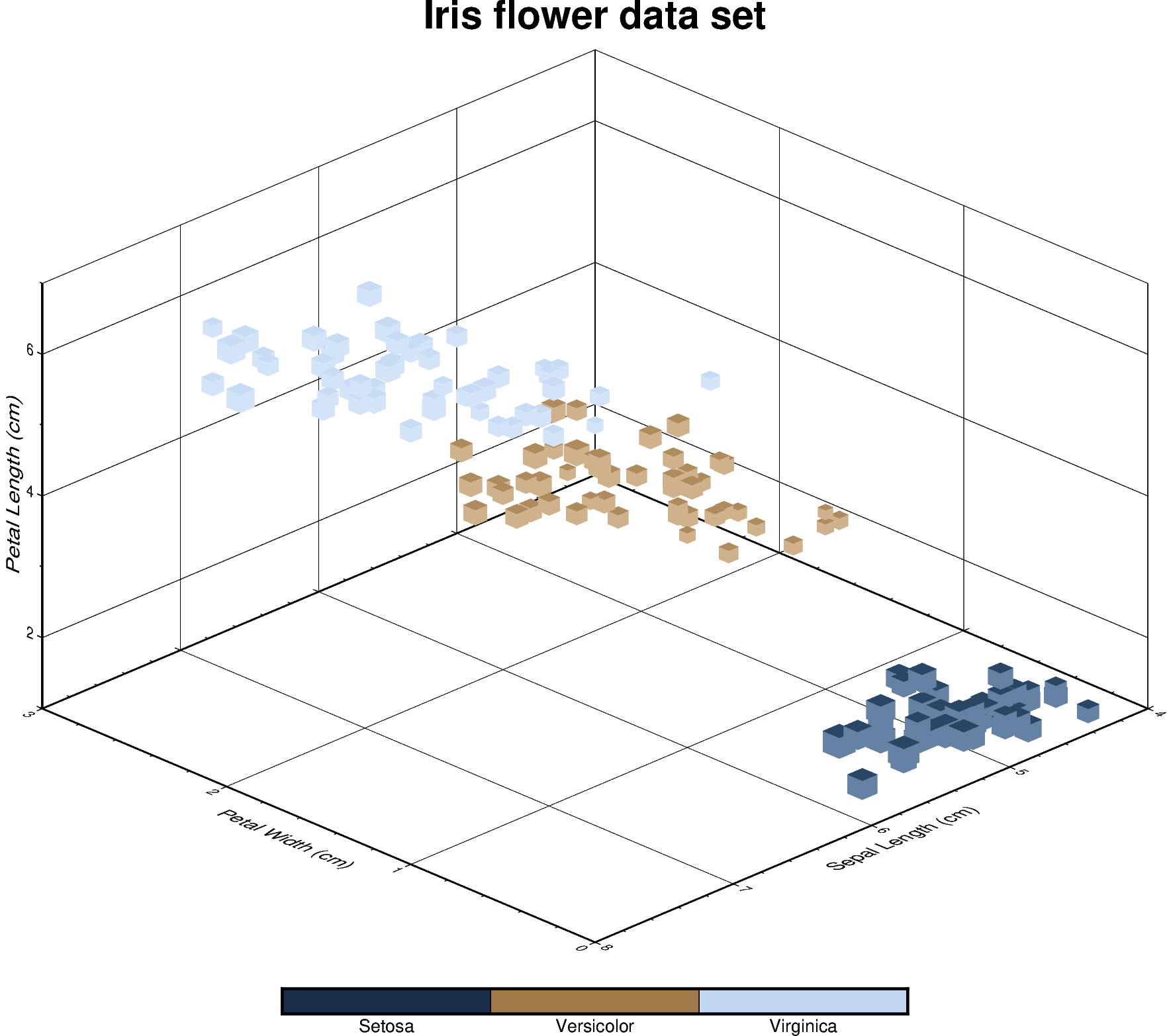Note
Click here to download the full example code
3D Scatter plots
The pygmt.Figure.plot3d method can be used to plot symbols in 3D.
In the example below, we show how the
Iris flower dataset
can be visualized using a perspective 3D plot. The region
parameter has to include the \(x\), \(y\), \(z\) axis limits in the
form of (xmin, xmax, ymin, ymax, zmin, zmax), which can be done automatically
using pygmt.info. To plot the z-axis frame, set frame as a
minimum to something like frame=["WsNeZ", "zaf"]. Use perspective to
control the azimuth and elevation angle of the view, and zscale to adjust
the vertical exaggeration factor.

Out:
/vercel/path0/examples/gallery/3d_plots/scatter3d.py:26: FutureWarning: The 'table' parameter has been deprecated since v0.5.0 and will be removed in v0.7.0. Please use 'data' instead.
region = pygmt.info(
<IPython.core.display.Image object>
import pandas as pd
import pygmt
# Load sample iris data and convert 'species' column to categorical dtype
df = pd.read_csv("https://github.com/mwaskom/seaborn-data/raw/master/iris.csv")
df.species = df.species.astype(dtype="category")
# Use pygmt.info to get region bounds (xmin, xmax, ymin, ymax, zmin, zmax)
# The below example will return a numpy array [0.0, 3.0, 4.0, 8.0, 1.0, 7.0]
region = pygmt.info(
table=df[["petal_width", "sepal_length", "petal_length"]], # x, y, z columns
per_column=True, # report the min/max values per column as a numpy array
# round the min/max values of the first three columns to the nearest
# multiple of 1, 2 and 0.5, respectively
spacing=(1, 2, 0.5),
)
# Make a 3D scatter plot, coloring each of the 3 species differently
fig = pygmt.Figure()
# Define a colormap to be used for three categories, define the range of the
# new discrete CPT using series=(lowest_value, highest_value, interval), use
# color_model="+cSetosa,Versicolor,Virginica" to write the discrete color
# palette "cubhelix" in categorical format and add the species names as
# annotations for the colorbar
pygmt.makecpt(
cmap="cubhelix", color_model="+cSetosa,Versicolor,Virginica", series=(0, 2, 1)
)
fig.plot3d(
# Use petal width, sepal length and petal length as x, y and z data input,
# respectively
x=df.petal_width,
y=df.sepal_length,
z=df.petal_length,
# Vary each symbol size according to another feature (sepal width, scaled
# by 0.1)
size=0.1 * df.sepal_width,
# Use 3D cubes ("u") as symbols, with size in centimeter units ("c")
style="uc",
# Points colored by categorical number code
color=df.species.cat.codes.astype(int),
# Use colormap created by makecpt
cmap=True,
# Set map dimensions (xmin, xmax, ymin, ymax, zmin, zmax)
region=region,
# Set frame parameters
frame=[
'WsNeZ3+t"Iris flower data set"', # z axis label positioned on 3rd corner, add title
'xafg+l"Petal Width (cm)"',
'yafg+l"Sepal Length (cm)"',
'zafg+l"Petal Length (cm)"',
],
# Set perspective to azimuth NorthWest (315°), at elevation 25°
perspective=[315, 25],
# Vertical exaggeration factor
zscale=1.5,
)
# Add colorbar legend
fig.colorbar(xshift=3.1)
fig.show()
Total running time of the script: ( 0 minutes 2.058 seconds)